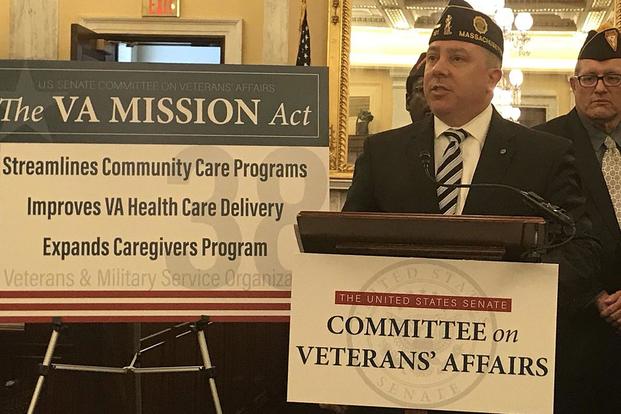Senate leaders said Tuesday that funding for the proposed $55 billion bill to expand private health care options at the Department of Veterans Affairs has yet to be identified but expressed confidence that the money will be found.
Sen. Johnny Isakson, R-Georgia, chairman of the Senate Veterans Affairs Committee, said he will meet with Sen. Richard Shelby, R-Alabama, chairman of the Senate Appropriations Committee, on funding sources.
"They're going to be provided," Isakson said of funds needed for the VA Mission Act over the next five years.
Sen. Jon Tester, a Montana Democrat and ranking member of Senate Veterans Affairs Committee, said, "I don't care how we pay for it. It needs to be paid for. We can work through this."
Tester and Isakson spoke at a Capitol Hill news conference with representatives of major veterans service organizations (VSOs) in support of the VA Mission Act, which passed in the House last week by a vote of 347-70.
Following the news conference, the Senate voted to limit debate on the bill. Isakson said he expects Senate passage, possibly on Wednesday, in an effort to get the legislation to President Donald Trump by Memorial Day for signing.
The bill would replace the current Veterans Choice Program for private and community health care for veterans, which is due to run out of funding by the end of May, according to acting VA Secretary Robert Wilkie.
Under the VA Mission Act, funding of $5.2 billion would be provided to extend the Choice program for one year while enacting reforms to improve care.
Isakson called the VA Mission Act the "last piece of a great mosaic to reform veterans benefits for our veterans."
The bill would "do away with the 40-mile rule and the 30-day rule" under Choice, in which private care is limited to veterans who live more than 40 miles from a VA facility or who must wait more than 30 days for an appointment, Isakson said.
However, the VA would remain the "gatekeeper" in approving private-care options in the best interests of the veteran, he said.
Isakson also noted the difficulty in reaching bipartisan consensus on the bill amid the ongoing turmoil at the Department of Veterans Affairs over the search for a permanent secretary and the struggle to fill thousands of health care vacancies at the VA.
"There were a few days last month when I didn't think we were going to make it" on the VA Mission Act, he said.
Tester cited the urgency to pass the bill. "The Choice program has been a wreck, OK? Every veteran up here will tell you that," he said.
The Choice program was enacted in 2014 following wait times scandals at the VA, and "the program was implemented quickly. It's had a lot of hiccups," Tester said.
In rural states such as Montana, "you can't always have a VA clinic in your hometown," he said, "but veterans shouldn't have to drive a couple of hours, two hours, to the nearest clinic or wait months for an appointment. That's why we need private health care to fill in the gaps when the VA cannot provide those services."
About one-third of the nine million veterans served annually by the VA currently receive private care, and neither Isakson nor Tester had an estimate on how that percentage might increase under the VA Mission Act.
At the Senate news conference, Louis Celli, legislative director for the American Legion, said the Choice program is unwieldy and has led to confusion on eligibility and the payment of bills for private care.
"Right now, there are seven different programs that the VA operates in order to administer community care -- that's seven different points of entry, seven different payment types, seven different ways for doctors to get paid," he said.
"And it's confusing to veterans, it's confusing to providers, and it's confusing to the VA,” Celli said. “Now it's time for Congress to fix that and put it all under one umbrella so that there's one single point of entry, there's one way for providers to bill the VA, there's one eligibility standard for veterans so that they can get the care they need.”
The VSOs had initially expressed fears that expanding private care would lead to the "privatization" of the VA, but Carlos Fuentes, national legislative services director of the Veterans of Foreign Wars, said the VA Mission Act "has the fingerprints of veterans who rely on the VA all over it."
The VA "can't be everything to everyone," he said, but the proposed bill "has the best interests of veterans at its core. While the bill fixes the Choice program, it also includes more than $10 billion worth of improvements to how VA doctors provide health care."
"This includes increases to loan repayment amounts, authority to practice telemedicine across state lines, and better recruitment and retention authorities to address VA's workforce vacancies. Overall, it strikes a balance between improving VA capacity and relying on the private sector," Fuentes said.
Garry Augustine, executive director of the Washington headquarters of the Disabled American Veterans (DAV), said the VA Mission Act also includes removal of restrictions on family caregivers assistance, which would no longer be limited to disabled post-9/11 veterans.
Extending caregivers assistance to disabled veterans of all eras is "the right thing to do" and would also limit costs by allowing disabled vets to remain at home, rather than be hospitalized, Augustine said. He added that home care averages less than $30,000 annually, while hospital care would amount to about $400,000 a year.
In a statement, DAV National Commander Delphine Metcalf-Foster said the VA Mission Act "marks a major milestone in attaining greater fairness for seriously injured veterans of all eras who need and rely on family caregivers."
"This groundbreaking legislation will not only support America's unsung heroes, but also make a number of reforms and improvements to expand veterans' access and strengthen the VA health care system," Metcalf-Foster said.
-- Richard Sisk can be reached at Richard.Sisk@Military.com.












